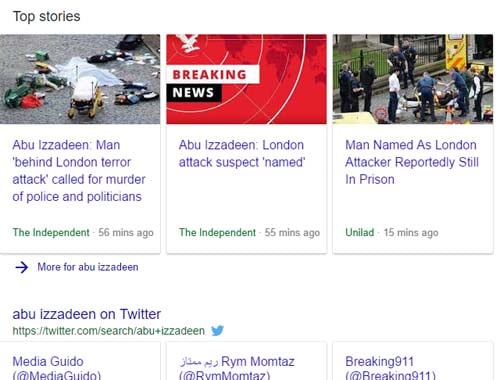Internet and media fuel rumours as to identity of Westminster attacker
Various unfounded rumours have swept the Internet claiming to purport to identify the Westminster attacker who killed a number of people in the streets of London.
Only hours after the tragic Westminster attacks in London, confusion swept the Internet as many media outlets and bloggers attempted to identify the attacker. But has the wrong man been named?
When tragic incidents occur of national interest, the media always attempt to be the first to break news and identify the people involved. While authorities constantly request for people to refrain from speculating on the identities of people involved and wait for suspects to be officially named, this rarely happens.
Channel 4 News, only hours after the attack, purported the identity of the attacker as Abu Izzadeen while live on air. Izzadeen is a known hate preacher living in the UK. Only minutes later, other mainstream media, including News.com.au and The Independent, as well as popular blogs like UniLad, repeated the claims. Soon after, Abu Izzadeen was trending on Twitter. According to the Internet, the attacker has been identified.

The Internet, only hours after the attack, had already condemned Abu Izzadeen, but now many are not so sure.
However doubts soon arose of the veracity of these reports, after Izzadeen’s solicitor purported that he was still in prison for other offenses. Soon after, Channel 4 issued the following statement –
On tonight’s Channel 4 News, senior home affairs correspondant Simon Israel quoted a source as saying that the name of the Westminster attacker was believed to be Abu Izzadeen, formerly known as Trevor Brooks.
During the course of the programme, conflicting information came to light. Channel 4 News is currently looking into this.
Channel 4 subsequently pulled coverage from its +1 channel, presumably related to this. The Independent and News.com.au deleted their articles (though they still remain at the time of writing on Google’s cache.) Other outlets rushed to provide updates or edits to their articles.
Sponsored Content. Continued below...
Something to remember…
Online witch hunts can often arise from mistaken identity. And in modern times, it’s the Internet that often acts as the starting pistol. This is why we need our mainstream media – those with the ability to disseminate information to thousands instantly – to be responsible with the way they report their news when covering such sensitive subjects.
Regardless of the identity of the attacker as Westminster, many media outlets failed to do that today.
The debacle rings of other online witch hunts fueled by poor journalism, including the events that occured after the Boston Marathon Bombings in 2013.
We don’t know who the attacker as Westminster was. And we – like many other responsible spectators – will wait for them to be officially identified.
Our advice? Don’t speculate. Don’t use unverified reports for your news. Wait for authorities to officially identify the names of those involved. That’s not directed just at our readers, but certain media outlets as well.
Continued below...
Thanks for reading, we hope this article helped, but before you leave us for greener pastures, please help us out.
We're hoping to be totally ad-free by 2025 - after all, no one likes online adverts, and all they do is get in the way and slow everything down. But of course we still have fees and costs to pay, so please, please consider becoming a Facebook supporter! It costs only 0.99p (~$1.30) a month (you can stop at any time) and ensures we can still keep posting Cybersecurity themed content to help keep our communities safe and scam-free. You can subscribe here
Remember, we're active on social media - so follow us on Facebook, Bluesky, Instagram and X
